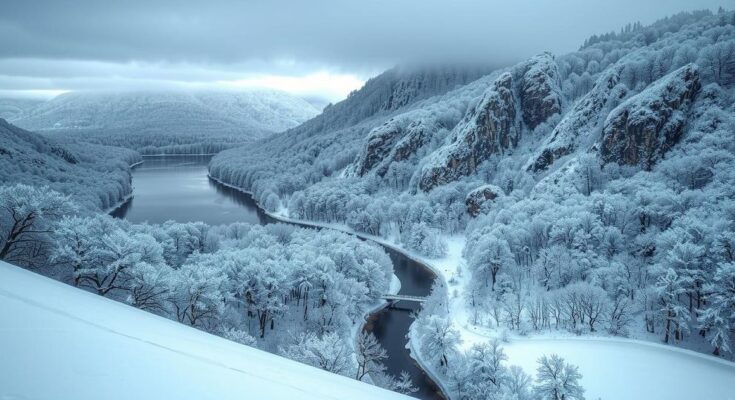A clipper system is bringing snow to the Great Lakes, Appalachians, and Northeast, with Winter Weather Advisories issued across several states. Colder air is sweeping into the Eastern U.S., while warmer temperatures persist in the Southwest. Snowfall is expected to reach several inches in certain areas as arctic air moves in this weekend.
A winter weather system is currently affecting the Great Lakes, the Appalachian region, and the Northeast. This clipper system is expected to deliver snow showers through Friday night, prompting the issuance of Winter Weather Advisories in several areas, including coastal Massachusetts and parts of western North Carolina through to Virginia and West Virginia. Colder air has begun to move into the eastern two-thirds of the United States, resulting in below-normal temperatures. In contrast, the Desert Southwest, particularly Phoenix, remains warm with temperatures reaching the low 80s, while arctic air conditions develop across the Northeast this weekend, potentially leading to single-digit temperatures in the Northern Plains. Snow accumulation across the Northeast could reach a few inches, mainly affecting New York State, northern Pennsylvania, and northern Maine. Additionally, North Dakota may see similar snowfall near the Canadian border, while some wet weather is anticipated in the Ohio Valley. To stay informed about any airport delays, travelers should consult their local airlines.
This article discusses the ongoing winter weather conditions as a clipper system moves through various regions of the United States, particularly affecting the Great Lakes and the Northeast. Winter Weather Advisories have been issued in response to expected snowfall and dropping temperatures, which indicate a shift towards a colder climate. This winter system not only leads to adverse weather conditions but also impacts daily commuting and travel across affected areas, necessitating close monitoring.
The winter weather event characterized by the approach of a clipper system will bring significant snowfall to the Northeast and the Great Lakes, while the Eastern United States braces for colder temperatures. Travelers are advised to prepare for potential delays and disrupted plans as winter conditions persist. With contrasting temperatures across the country, it is crucial to remain vigilant about local weather updates to ensure safety during this period.
Original Source: mynews13.com




